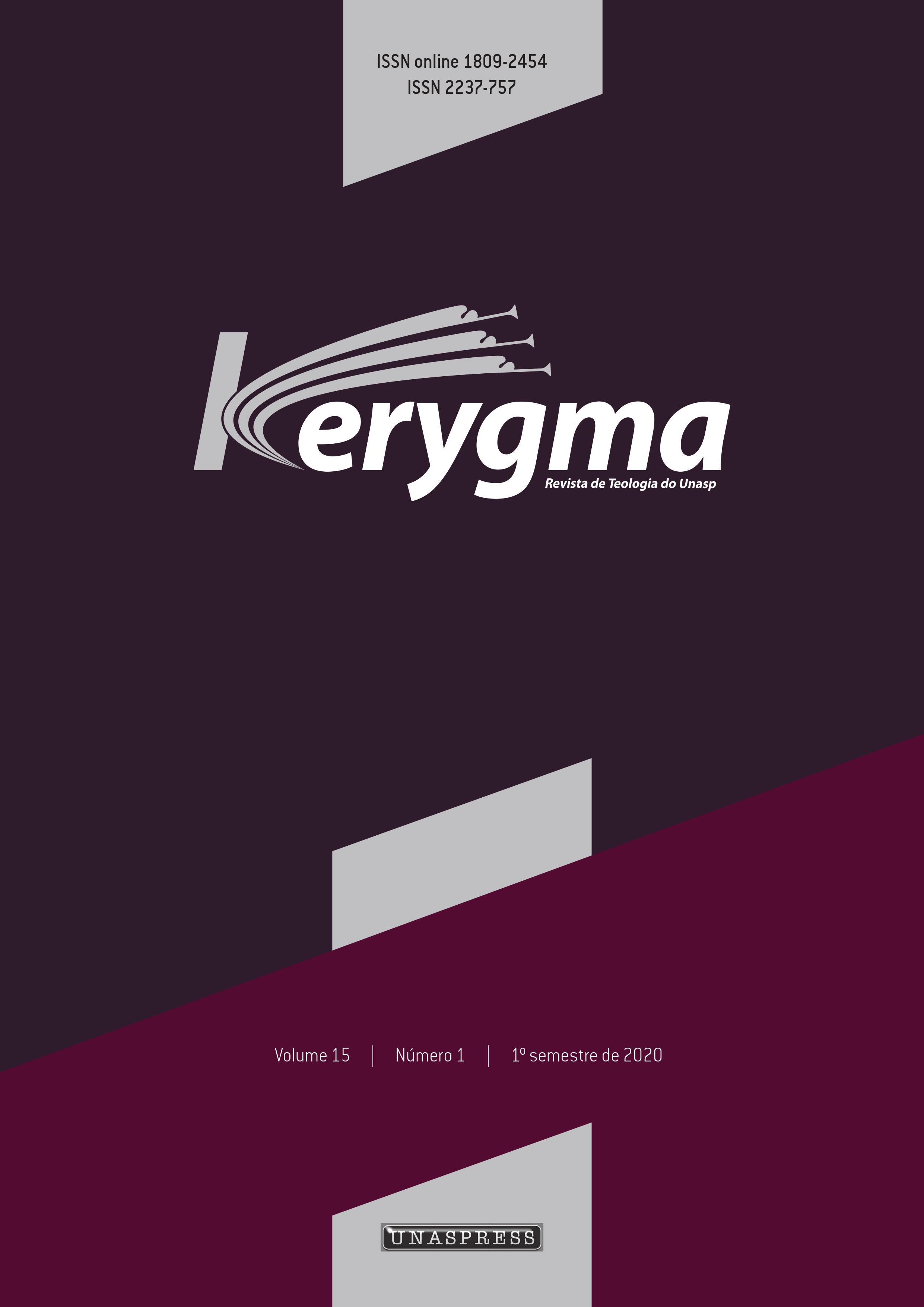A MISSIOLOGIC COMPREHENSION OF COVID-19
DOI:
https://doi.org/10.19141/1809-2454.kerygma.v15.n1.p73-85Keywords:
missiology, interseccionality, intersectionality, ecclesiology, seventh-day adventistAbstract
The novel coronavirus pandemic forced Christian church around the world to revisit their fundamental self-understanding and activities. Through ethnographic lenses, the researchers analyze reactions and adaptations in face of Covid-19 by religious leaders from Southern California, USA. Having one of the authors as an observant-participant, the article includes a case study of the Seventh-day Adventist Glendale City Church (GCC). Based on the concept of intersectionality, a theoretical framework to understand how one’s identities and experiences combined produce advantages and disadvantages, the article proposes the primacy of the epistemic logic of love, according to 1 Corinthians 13. As per this scenario, what would be an appropriate missiological understanding of Covid-19?
Downloads
References
ABOUT Our Church. Glendale City Church website, 2019. Disponível em: <https://bit.ly/3aTR7lJ>. Acesso em: 07 jul. 2020.
AMMERMAN, N. T. Spiritual but Not Religious? Beyond Binary Choices in the Study of Religion. Journal for the Scientific Study of Religion, v. 52, n. 2, p. 258-278, jun. 2013.
BRANSON, M.; MARTINEZ, J. F. Churches, Cultures and Leadership: A Practical Theology of Congregations and Ethnicities, Westmont: IVP Academic, 2011. E-book.
CROUCH, A.; KEILHACKER, K.; BLANCHARD, D. Leading Beyond the Blizzard: Why Every Organization Is Now a Startup. The Praxis Journal, 20 mar. 2020. Disponível em: <https://bit.ly/3lek80d>. Acesso em: 7 jul. 2020.
GECEWICZ, C. Few Americans say their house of worship is open, but a quarter say their faith has grown amid pandemic. Pew Research Center, 30 abr. 2020. Disponível em: <https://pewrsr.ch/2FJyG7F>. Acesso em: 9 jul. 2020.
HOW Technology is Changing Millennial Faith. Barna, 15 out. 2013. Disponível em: <https://bit.ly/2YwQ4Mh>. Acesso em: 9 jul. 2020.
JEFFERY, A. See Religions Around the World Adapt in the Age of Coronavirus. CNBC, 10 abr. 2020. Disponível em: <https://cnb.cx/3j7Y4T5>. Acesso em: 13 jul. 2020.
KIM, G. J.; SHAW; SUSAN, M. Intersectional Theology. Minneapolis, MN: Fortress Press, 2018.
MELO, C. Como o coronavírus vai mudar nossas vidas: dez tendências para o mundo pós-pandemia. El País, 13 abr. 2020. Disponível em: <https://bit.ly/3gwQjoc>. Acesso em: 9 jul. 2020.
MERCADANTE, L. A. Belief without Borders. Oxford, UK: Oxford University Press, 2014.
PUTNAM, R. D.; CAMPBELL, D. E. Walking Away from Church. Los Angeles Times, 17 out. 2010. Disponível em: <https://lat.ms/34tNiTd>. Acesso em: 7 jul. 2020.
SPICKARD, J. V. Alternative Sociologies of Religion. New York: NYU Press, 2017.
STEINMETZ, K. She Coined the Term ‘Intersectionality’ Over 30 Years Ago. Here’s What It Means to Her Today. Time, 20 fev. 2020. Disponível em: <https://bit.ly/3hqjuu1>. Acesso em: 13 jul. 2020.
WHITE, J. E. 5 Ways the Pandemic Is Saving the Church. Church&Culture, 20 abr. 2020. Disponível em: <https://bit.ly/31ntmPF>. Acesso em: 09 jul. 2020a.
WHITE, J. E. Covid-19 and Generation Z. Crosswalk, 13 abr. 2020. Disponível em: <https://bit.ly/2QixtGF>. Acesso em: 07 jul. 2020b.
WILLIMON, W. H. Corpus Christi: Carnal Thoughts on a Spiritual Day. The Christian Century, 3-10 jun. 1981.
Downloads
Published
How to Cite
Issue
Section
License
Copyright Statement
In summary, authors who publish in Kerygma must agree that:
-
Once accepted for publication, the copyright of the articles is transferred to Kerygma.
-
All third-party materials used in the text must be properly referenced.
-
Authors must hold the rights or permissions for the use of images, tables, and other graphic materials.
-
Authors guarantee that the submitted manuscript is original, of their own authorship, and has not been submitted or published elsewhere.
-
The opinions and ideas expressed in the texts are the sole responsibility of the authors and do not necessarily reflect the views of the journal.
-
The editors reserve the right to make textual revisions and adjustments in accordance with the journal’s editorial standards.
-
Authors retain copyright and grant the journal the right of first publication, with the work licensed under the Creative Commons Attribution–NonCommercial 4.0 International License.
-
Authors authorize the reproduction and adaptation of the material by Kerygma, with the authors’ participation or express authorization when required.
-
The journal may distribute, store, archive, and make the articles available through any physical or digital means, whether free of charge or paid.
-
Authors may enter into separate agreements for the non-exclusive distribution of the published version of the work, provided that the original publication in Kerygma is acknowledged.
-
Full or partial reproduction of the texts in other publications requires prior written authorization from the editor.
-
Authors are permitted and encouraged to publish and distribute their work online (e.g., in institutional repositories or personal webpages) before or during the editorial process, as this may increase the visibility and citation impact of the published work.














